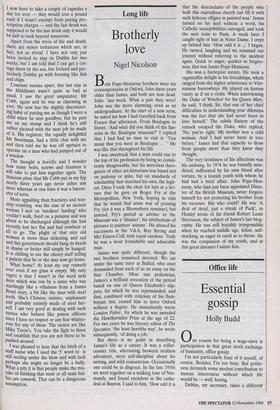Long life
Brotherly love
Nigel Nicolson
Both Pope-Hennessy brothers were my contemporaries at Oxford, John three years older than James, and both are now dead. John last week. What a pair they were! John was the more alarming, even as an undergraduate. At the start of a new term, he asked me how I had travelled back from France that afternoon. From Boulogne to Dover. 'And what did you think of the Sas- setta in the Boulogne museum?' I replied that I had had no time to visit it. 'You mean that you were in Boulogne . . . ' He was like that throughout his life.
I was awestruck that a man could rise to the top of his profession by being so consis- tently disagreeable, but his merciless dero- gation of other art-historians was based not on jealousy or spite, but on standards of scholarship that matched his own, the high- est. Once I took the chair for him at a lec- ture that he gave on Roger Fry at the Metropolitan, New York, hoping in vain that he would find some way of praising Fry (for it was a Bloomsbury seminar), but instead, Fry's period as adviser to the Museum was a 'disaster', his attributions of pictures to painters 'asinine'. He abused his successors at the V&A, Roy Strong and Mrs Esteve-Coll, with equal candour. Truly he was a most formidable and admirable man.
James was quite different, though the two brothers remained devoted. We sat under the same tutor at Balliol, who once demanded from each of us an essay on the Star Chamber. Mine was pedestrian, James's a brilliant evocation of the period based on one of Queen Elizabeth's slip- pers, for which he was reprimanded, and that, combined with criticism of his flam- boyant ties, caused him to leave Oxford without a degree. He immediately wrote London Fabric, for which he was awarded the Hawthornden Prize at the age of 22. For two years he was literary editor of The Spectator, 'the least horrible way', he wrote subsequently, 'of doing a job.'
But there is no point in describing James's life as a career. It was a roller- coaster ride, alternating between reckless adventure, stern self-discipline about his writing, and wild romanticism. Occasionally one could be in disgrace. In the late 1930s we went together on a walking tour of Nor- mandy, and found ourselves in the cathe- dral at Bayeux. I said to him, 'How odd it is that the descendants of the people who built this marvellous church can fill it with such hideous effigies in painted wax.' James turned on his heel without a word, his Catholic susceptibilities outraged, and took the next train to Paris. A week later I caught sight of him in Notre Dame. I crept up behind him. 'How odd it is ..,' I began. He turned, laughing and we resumed our journey without referring to the incident again. Quick to anger, quicker to forgive- ness, that was James Pope-Hennessy.
His was a harlequin nature. He took a ragamuffin delight in his friendships, which ranged from the higher aristocracy to Viet- namese barrowboys. He played on human vanity as if on a violin. When interviewing the Duke of Windsor for his Queen Maly, he said, 'I think, Sir, that one of her chief difficulties in understanding your dilemma was the fact that she had never been in love herself.' The subtle flattery of the remark escaped the Duke, who replied, `No, you're right. My mother was a cold woman. And I had never been in love before.' James had that capacity to draw from people more than they knew they thought.
The very lavishness of his affections was his undoing. In 1974 he was brutally mur- dered, suffocated by his own blood after torture, by a loutish youth with whom he had had a brief affair. John Pope-Hen- nessy, who had just been appointed Direc- tor of the British Museum, never forgave himself for not protecting his brother from his excesses. But who could? He was 'A deal of Ariel, just a streak of Puck', as Henley wrote of his friend Robert Louis Stevenson, the subject of James's last biog- raphy. He was still boyishly irresponsible when he reached middle age, feline, self- mocking, as eager to catch as to throw. He was the companion of my youth, and at this great distance I salute him.


































































 Previous page
Previous page